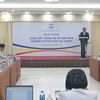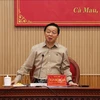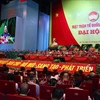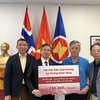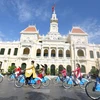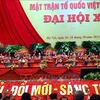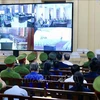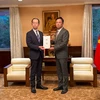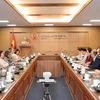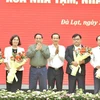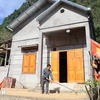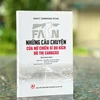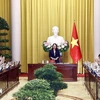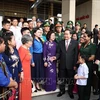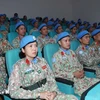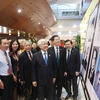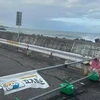More than 500 Vietnamese and foreign scientists and experts in sustainable development and traffic safety, as well as representatives from relevant ministries, sectors, organisations and enterprises took part in the 2012 International Conference on Traffic Safety that opened in Hanoi on November 22.
The event, held by the National Committee for Traffic Safety and the World Bank in Vietnam , was addressed by Deputy Prime Minister Nguyen Xuan Phuc, who is also head of the committee. He said that the Vietnamese Government considers transport development as the fuel for socio-economic development in Vietnam .
The Government is aware of the risk of losing balance between transport demand and infrastructure capacity, as well as between the intricacies of transport and the ability and effectiveness of the implementation of policies and laws, he said, adding that these imbalances are the causes of traffic congestion in big cities, especially on key roads, and traffic accidents.
Phuc cited that from 2002 to 2011, an average of 16,000 traffic accidents occurred in Vietnam each year, killing 11,000 people and wounding 13,000.
He emphasised that the Vietnamese Government has adopted a number of resolutions, decrees and instructions while strictly applying various synchronised measures, including the establishment of a National Committee for Traffic Safety and a similar committee in every province and city to effectively ensure traffic order and safety.
This year, the country has made significant progress in the field. People’s awareness of traffic law has improved, while the number of accidents has reduced, he said.
However, he said, this is the first step forward, as the general situation remains serious with enormous challenges.
In response to the United Nations programme “Decade of Action for Road Safety” in the 2011-20 period, the Vietnamese Government commits to reducing the number of accidents by 50 percent compared to 2011, affirmed the Deputy PM.
The two-day conference is expected to help Vietnam design policies, strategies and plans to ensure traffic safety and order in both the short term and long term.
Doctor Nguyen Thanh Phong, deputy head of the Transport Development and Strategy Institute, said it is necessary to give comprehensive and overall directions to create effective measures to manage traffic safety.
According to Doctor Ing Hagen Schueller from the German organisation PTV Planung Transport Verkehr AG, all aspects of traffic safety should be considered through road and traffic management procedures.
Professor Hoang Chuong from the Centre for Preservation and Promotion of National Culture affirmed that traffic culture, including material and spiritual culture, will contribute to reducing traffic accidents.
The material culture is shown in the use of traffic infrastructure and vehicle and traffic directing equipment, while the spiritual culture can be seen in the implementation of traffic law, he said. The building of a traffic culture will initiate a modern, safe and friendly traffic environment, he added.
Stressing the role of Paramedics, he said the coordination among branches and sectors is crucial.
Within the framework of the conference, the participants will make a fact-finding tour to northern Ninh Binh province./.
The event, held by the National Committee for Traffic Safety and the World Bank in Vietnam , was addressed by Deputy Prime Minister Nguyen Xuan Phuc, who is also head of the committee. He said that the Vietnamese Government considers transport development as the fuel for socio-economic development in Vietnam .
The Government is aware of the risk of losing balance between transport demand and infrastructure capacity, as well as between the intricacies of transport and the ability and effectiveness of the implementation of policies and laws, he said, adding that these imbalances are the causes of traffic congestion in big cities, especially on key roads, and traffic accidents.
Phuc cited that from 2002 to 2011, an average of 16,000 traffic accidents occurred in Vietnam each year, killing 11,000 people and wounding 13,000.
He emphasised that the Vietnamese Government has adopted a number of resolutions, decrees and instructions while strictly applying various synchronised measures, including the establishment of a National Committee for Traffic Safety and a similar committee in every province and city to effectively ensure traffic order and safety.
This year, the country has made significant progress in the field. People’s awareness of traffic law has improved, while the number of accidents has reduced, he said.
However, he said, this is the first step forward, as the general situation remains serious with enormous challenges.
In response to the United Nations programme “Decade of Action for Road Safety” in the 2011-20 period, the Vietnamese Government commits to reducing the number of accidents by 50 percent compared to 2011, affirmed the Deputy PM.
The two-day conference is expected to help Vietnam design policies, strategies and plans to ensure traffic safety and order in both the short term and long term.
Doctor Nguyen Thanh Phong, deputy head of the Transport Development and Strategy Institute, said it is necessary to give comprehensive and overall directions to create effective measures to manage traffic safety.
According to Doctor Ing Hagen Schueller from the German organisation PTV Planung Transport Verkehr AG, all aspects of traffic safety should be considered through road and traffic management procedures.
Professor Hoang Chuong from the Centre for Preservation and Promotion of National Culture affirmed that traffic culture, including material and spiritual culture, will contribute to reducing traffic accidents.
The material culture is shown in the use of traffic infrastructure and vehicle and traffic directing equipment, while the spiritual culture can be seen in the implementation of traffic law, he said. The building of a traffic culture will initiate a modern, safe and friendly traffic environment, he added.
Stressing the role of Paramedics, he said the coordination among branches and sectors is crucial.
Within the framework of the conference, the participants will make a fact-finding tour to northern Ninh Binh province./.
